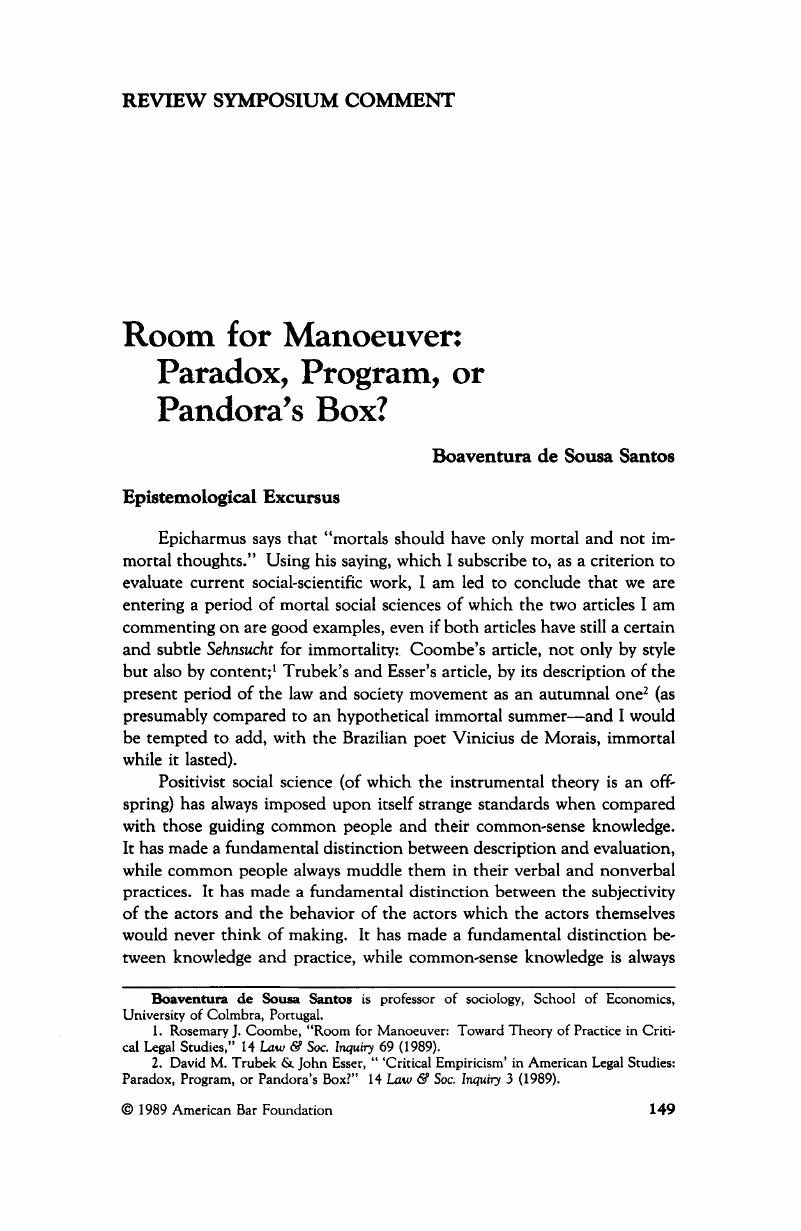Article contents
Room for Manoeuver: Paradox, Program, or Pandora's Box?
Published online by Cambridge University Press: 27 December 2018
Abstract

- Type
- Review Symposium Comment
- Information
- Copyright
- Copyright © American Bar Foundation, 1989
References
1 Coombe, Rosemary J., “Room for Manoeuver: Toward Theory of Practice in Critical Legal Studies,” 14 Law & Soc. Inquiry 69 (1989).CrossRefGoogle Scholar
2 Trubek, David M. & Esser, John, “‘Critical Empiricism’ in American Legal Studies: Paradox, Program, or Pandora's Box?” 14 Law & Soc. Inquiry 3 (1989).Google Scholar
3 Gaston Bachelard, Le Nouvel Esprit Scientifique (Paris: P. U. F., 1971); id, Gaston Bachelard, La Formation de l'Esprit Scientifique (Paris: J. Vrin, 1972).Google Scholar
4 Jean Piager, ed., Logique et Connaisance Scientifique 7 (Paris: Gallimard, 1967).Google Scholar
5 Boaventura de Sousa Santos, Um Discurso Sobre as Ciecias (Porto: Afrontamento, 1988); id., Introduo a Uma Ciecia Pós-Modema (Porto: Afrontamento, 1989; forthcoming).Google Scholar
6 Ludwig Wittgenstein, Philosophische Untersuchungen (Frankfurt: Suhrkamp, 1971).Google Scholar
7 Martin Heidigger, Vom Wesen des Grundes (Frankfurt: Klostermann, 1955); id., Was ist Metaphysik? (Frankfurt: Klostermann, 1960); id., Vom Wesen der Wahrheit (Frankfurt: Kostermann, 1961).Google Scholar
8 John Dewey, Essays in Experimental Logic (New York: Dover, 1916); Id., Human Nature and Conduct (New York: Modern Library, 1957); id., Reconstruction in Philosophy (Boston: Beacon Press, 1957); id., The Quest for Certainty (New York: Capricorn Books, 1960); id., Philosophy of Education (Totowa, N. J.: Littlefields, Adams, 1975).Google Scholar
9 Richard Rorty, Philosophy and the Mirror of Nature 390 (Princeton, N. J.: Princeton University Press, 1980).Google Scholar
10 Id. at 320Google Scholar
11 Theodor Adorno, Against Epistemology: A Metacritique (Cambridge, Mass.: M. I. T. Press, 1984).Google Scholar
12 See my works cited in note 5.Google Scholar
13 Pierre Bourdieu & J.-J, Chamboredon, Le Métier de Sociologue (Paris: Mouton, 1968).Google Scholar
14 de Sousa Santos, Boaventura, “On Modes of Production of Law and Social Power,” 13 Intern'l J. Soc. L. 299 (1985).Google Scholar
15 Pierre Bourdieu & J. C. Passeron, La Reproduction (Paris: Minuit, 1970); Pierre Bourdieu, La Distinction (Paris: Minuit, 1979).Google Scholar
16 Michael Polanyi, Personal Knowledge (Chicago: University of Chicago Press, 1962).Google Scholar
17 Pierre Bourdieu, Leçon sur la Leçon 56 (Paris: Minuit, 1982).Google Scholar
18 C. Wright Mills, The Sociological Imagination (London: Oxford University Press, 1970).Google Scholar
19 Howard Becker, “Whose Side Are We On?”in L. Reynolds & J. Reynolds, eds., The Sociology of Sociology (New York: David McKay, 1970).Google Scholar
20 Alvin Gouldner, The Coming Crisis of Westem Sociology (New York: Avon, 1971).Google Scholar
21 Paul Bohannon, ed., Law and Warfare 45 (Garden City, N. Y.: Natural History Press, 1967).Google Scholar
22 Boaventura de Sousa Santos, “The Postmodern Transition: Law and Politics” (Amherst College, 1988).Google Scholar
23 Jon Elster, Ulysses and the Sirens (Cambridge: Cambridge University Press, 1984); id., Sour Grapes (Cambridge: Cambridge University Press, 1985).Google Scholar
24 Maria Irene Santos, “Poetry in America: The Question of Gender,”Genre XX at 153, 156 (1987).Google Scholar
25 Ivan Illich, Tools for Conviviality (New York: Harper & Row, 1973).Google Scholar
26 de Sousa Santos, Boaventura, “Law: A Map of Misreading. Toward a Post-modern Conception of Law,” 14 J. L. & Soc'y 279 (1987).Google Scholar
27 Jameson, Fredric, “Third-World Literature in the Era of Multinational Capitalism,” 15 Social Text 65, 77 (1986).Google Scholar
28 Id. at 85.Google Scholar
29 Id. at 69.Google Scholar
30 Id. Google Scholar
- 3
- Cited by


